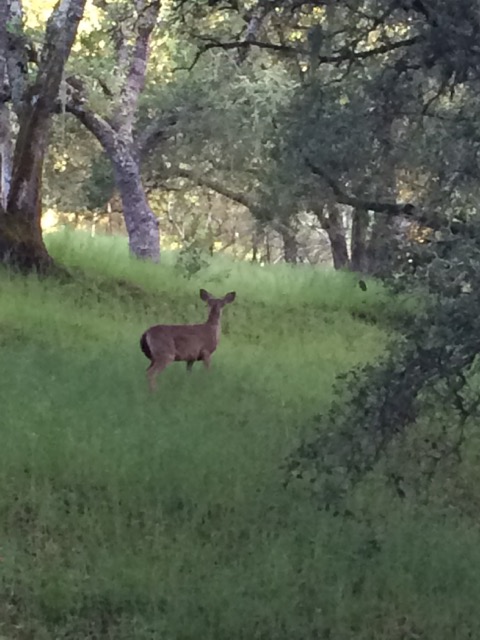Holding Onto Grudges

A deer at Rancho from a few years ago. I thought it appropriate to the idea of freedom and letting go.
On Tuesday, I went for a hike with a new friend, J-N, who I met that morning for the first time. We were supposed to hike with another woman, a mutual friend, but since she couldn’t come, J-N and I found ourselves in the funny position of meeting for a hike without ever having seen each other before. Despite our lack of familiarity with each other, we quickly dove into the depths of a rather personal conversation. From talking about love of the outdoors, to sharing how we met our life’s partners, we soon progressed to speaking about life itself, and through that, to my year to live and my death in (now) 361 days.
As we talked and walked, I found myself time and again complaining about grievances from my past. “Wow, I am still bearing a grudge,” I commented each time, wondering at myself for my ultra-long memory in keeping resentments. I was carrying my usual, regular backpack, as I always do, but as one grudge after another flickered to life in my memory, it occurred to me that my physical backpack was not the only one I was carrying. There I was, in the greenness and beauty of a gloriously wild place, in the sunny clarity of a California summery winter day, carrying on my back a gaggle of grudges, seemingly without any intention to let them go.
Our walk passed through rolling meadows, low oak forests, and inside the brim of a gorge almost completely overrun by fallen and uprooted trees and shrubs (perhaps the result of the last storm). Still-green trees and shrubs lay in the path of the creek, creating what could almost be a dam, and we wondered what would happen in the creek bed when the rains came again. “Erosion,” J-N said, looking at the destruction around us. We couldn’t help but imagine the violence of the storms that brought about so much collapse, that worked their way by wind and water around the roots of these trees, till finally those mighty beings could hold onto the ground no more, and even they, the giants of the earth, succumbed to the inevitability of the circle of life.
Grudges work the same way, I thought. They insidiously wear away at the foundations, exhausting good will, trust, and peace of mind. Even the tallest tree or the hardiest shrub cannot withstand the repeated corrosive efforts of resentment. I looked in the face of each one of my grudges as they came up, and I was surprised to see how little true emotion was left in them. Rather, these grudges I was holding onto, as though my world depended on them, were like a frayed tale, told so many times that it no longer held any meaning.
“As you hike,” a friend once suggested a meditation, “imagine you are carrying with you a backpack filled with all your sorrows, upsets, ill will, and anger. While hiking up a mountain, pause once in a while, perhaps during switchbacks in the trail, and imagine yourself opening the backpack and taking something out. Leave these by the side of the trail, one at a time. You can always pick them up on your way back, if you need to, but perhaps by the time you hike down you will realize you no longer need those burdens you’ve carried, and you can leave them there to be recycled back into the earth.”
In these last 361 days which I have before I die, I would like to let go of as many grudges and resentments as I can. For a moment there, during my hike with J-N, I could see with utter clarity what it would be like not to carry these grudges anymore, to hike without the backpack of resentment. If you’ve ever gone backpacking before, you know the relief of setting your pack down after a long day of hiking. The backpack, containing everything you need to live in the woods for a while, becomes a part of the body, turning you into a big turtle who is carrying its house. Setting it down is like a revelation, a release, a freedom that can only be experienced, impossible to describe.
I have carried my grudges long. I have brought them with me so far. But now, I think, it is time to set them down, one at a time. Like ultra-light backpacking, or like John Muir hiking only with his tin cup and a blanket, so do I too wish to complete the journey of my life with as little baggage as I can. Whether this means forgiving myself, forgiving others, or begging others for their forgiveness, I am getting ready to step into the creek bed and allow the water and the wind to wear the foundations of my grudge-constructs down. These stories I’ve been telling myself for so long, unlike the trees downed that I saw in my hike with J-N, were never really alive. It is time, as Jack Kornfield says, to let go of all hope of a better past. I like this idea. Wish me luck.
The class “A Year to Live” is offered by Against the Stream Buddhist Meditation Society in SF. It is based on the book A Year to Live by Stephen Levine.

